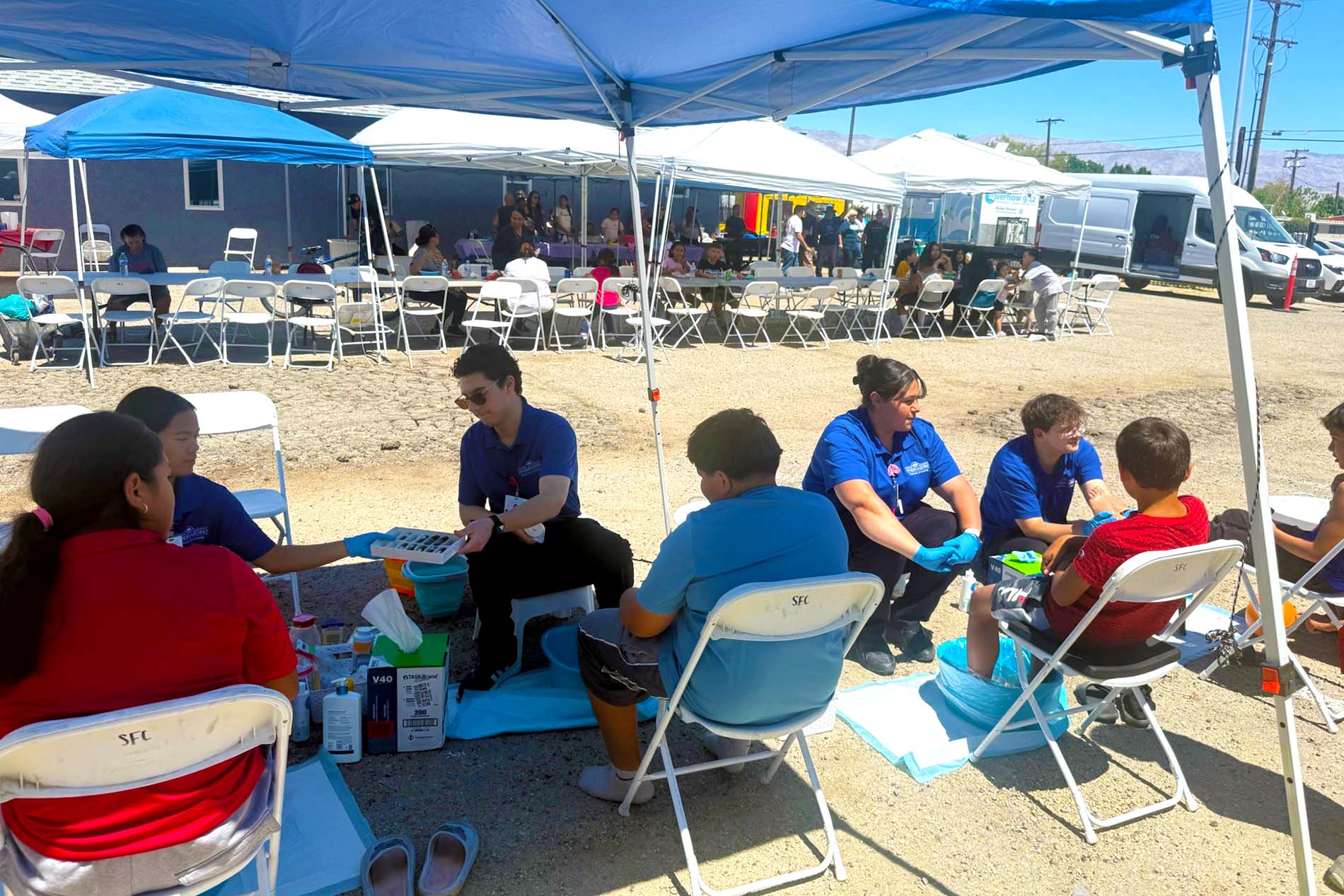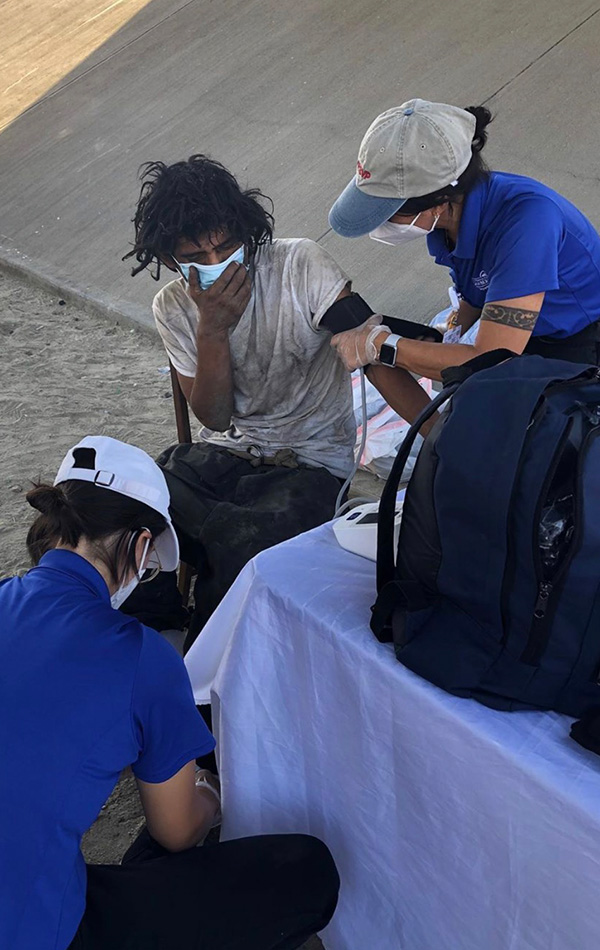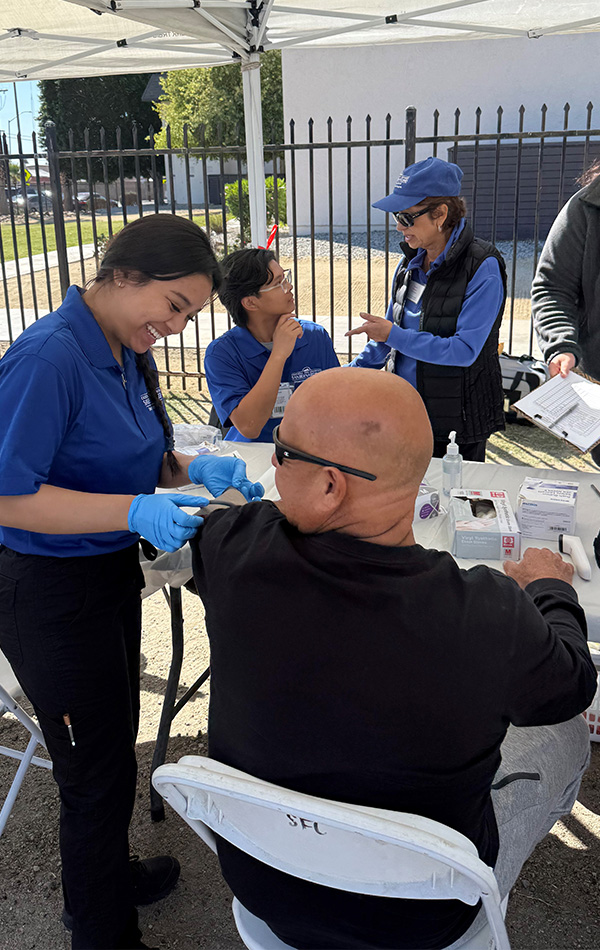CSUSB Palm Desert Campus Nursing Street Medicine Program taking healthcare to the streets

In the sun-scorched landscape of the Coachella Valley, where unsheltered individuals often fall through the cracks of traditional healthcare systems, a transformative initiative is rewriting the script on community nursing.
Launched at Cal State San Bernardino’s Palm Desert Campus (PDC) in 2019, the Nursing Street Medicine Program brings compassionate, hands-on care directly to those in need—empowering both patients and future nurses alike.



Bringing Healthcare to the Streets
Diane Vines, executive director and visionary behind the program, and Samantha Duffle, director, lead teams of nursing students and faculty at shelters, food distribution sites, homeless encampments, cooling centers and mobile clinics, providing a broad spectrum of services, including wound care, vital-sign monitoring, blood glucose testing, foot soaks, chronic disease oversight, medication management and preventative health education.
These clinics aren’t just “pop up” events—they’re lifelines, operating year-round and entirely free to clients. The goal is dual: alleviate pressure on emergency departments and foster long-term well-being among vulnerable residents.
“Students are encouraged to call the participants by their name and make eye contact as they learn about the life of the unhoused person,” said Vines. “These interactions are often rare for this population.”
Diane Vines
executive director
Foot Soaks with Heart: A Different Kind of Care
The introduction of therapeutic foot soaks marked a shift beyond clinical routines. Students create relaxing environments with chairs for the guests (the program refers to the people it helps as guests) and a lower stool for the student. They sit face-to-face with the guest seated higher to convey respect, and the student is able to ask about their life. Each foot soak takes about 10-15 minutes, incorporating Epsom salts and the essential oils of the guest’s choosing. These sessions are not only comforting but deeply humanizing; students learn empathy and the power of listening, of treating all individuals with respect.
“Students are encouraged to call the participants by their name and make eye contact as they learn about the life of the unhoused person,” said Vines. “These interactions are often rare for this population.”
Empowering Students, Enriching Communities
For PDC nursing students, the program is a living classroom. They assess, educate and treat patients under faculty supervision—earning course credit or volunteer hours while learning empathy in real time. Clinical opportunities range from flu and COVID 19 vaccinations, to establishing telehealth behavioral assessments.
In Their Shoes: A Student Perspective
“It’s been one of the best experiences of my life. It’s made me a better human. It’s also showed me how much of a difference you can make in somebody’s day, in somebody’s week, potentially in somebody’s life by just taking the time to make a genuine connection and make them feel seen.” Sarah Harrington, nursing student
“Each individual experiencing homelessness has a unique story and struggles that often go unseen. By offering our time and services to them or simply lending an empathetic ear, not only are we providing essential nursing and other health services, we are also helping to restore their dignity and hope. Volunteering in this program helps us learn to build connections and understanding with our patients and bridging the gap between different walks of life.” Donovan T. McKeever, nursing student
“They’re doing important work that aligns with our values. They are contributing to the healthcare workforce by equipping local students with skills they will have throughout their careers.”
Chris Christensen
CEO of Desert Healthcare District & Foundation, highlights the program’s significance
Impact and Beyond
The impact speaks volumes:
- Hundreds of individuals have received primary and behavioral health services, often avoiding unnecessary ER visits.
- Student nurses develop skills in public health nursing, chronic-disease care and telehealth—all within a framework of empathy and cultural competence.
- The broader community trusts CSUSB as a valuable, caring partner—nurses are no longer just healthcare workers but bridge-builders between marginalized populations and the healthcare system at large.
“They’re doing important work that aligns with our values,” he said. “They are contributing to the healthcare workforce by equipping local students with skills they will have throughout their careers.”
A Beacon of Hope in the Desert
The PDC Nursing Street Medicine Program exemplifies how education, healthcare and community service can transform lives—both for those receiving care and those delivering it. Nursing students carry heart, skill and hope, demonstrating that access, respect and empathy can flourish even in the harshest of conditions.
Cal State San Bernardino, set at the foothills of the beautiful San Bernardino Mountains, is a vibrant hub of education and culture in Inland Southern California. The university offers more than 70 traditional baccalaureate and master’s degree programs, education credential and certificate programs, and a doctoral program, all housed within five academic colleges and the Palm Desert Campus.
Not only is a degree from CSUSB affordable and attainable, it is also a pathway to a brighter future. Ranked No. 2 nationally for social mobility by the Wall Street Journal, CSUSB helps students rise to great opportunities, securing high-paying jobs while keeping costs low.
The university is consistently recognized for its academic excellence, affordability and commitment to empowering students and communities to achieve their fullest potential.
Follow Us
Follow Us


